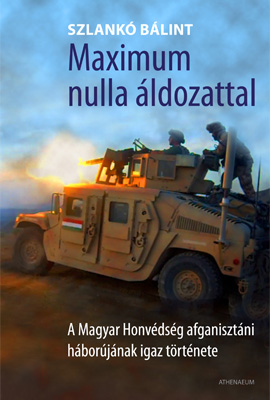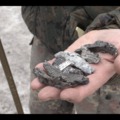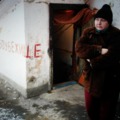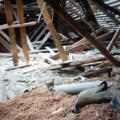Tudom, hogy ennek a blognak az a lenyege, hogy vegre magyarul irjak, de azert kiteszem ezt is ide. Ez kicsit reszletesebb, mint a masik cikk volt. A World Politics Review nevu cuccban jelent meg ma.
HELMAND PROVINCE, Afghanistan -- Marine Capt. Scott Cuomo of Fox company, 2nd battalion, 2nd Marine regiment, must have felt very confident. How else to explain his climbing into an armorless Afghan army truck -- a coffin on four wheels -- next to Haji Abdullah Jan, the Afghan district governor, with only a few Afghan army soldiers for protection, to speed down empty dirt roads almost certainly mined by the Taliban?
But Cuomo's confidence is not misplaced. The men make it safely to their destination: a destroyed compound beside which the barren, twisted remains of three dead trees point grotesquely to the sky. The district governor, clearly moved, walks to the building. It is his house, which he is visiting for the first time in four years because of the war. Cuomo grins excitedly. The governor is home.
"This is a big success," Cuomo says. "It may be harder to quantify than counting the number of bad guys we have killed, but it is success."
Garmsir district lies in the southern-central part of Helmand, Afghanistan's most war-torn province and home to a massive, opium-fed insurgency. Since 2006, most of the district had been Taliban country. Forays by the British army, until recently the NATO nation in charge of Helmand, had never quite managed to dislodge the insurgents, in part because the British never had enough troops to hold and build the areas that they had cleared of insurgents.
All that is changing. And this may herald the most significant shift in the efforts to stamp out the Taliban insurgency in the south of Afghanistan since its resurgence in 2006. Thanks to the recent influx of thousands of U.S. Marines, bringing the total number of Western forces in Helmand alone to 20,000, NATO has enough troops to fight a proper counterinsurgency campaign here for the first time.
And it seems to be producing some results.
Following an offensive that began last July, the Marines managed to secure most of Garmsir by the end of the year. The southern bit of the district is still under Taliban control, but most of the district is now regularly patrolled by American and Afghan government forces. And after months of fighting, the area is relatively secure.
"When this company first came here last November, we had to fight every day. Now, we haven't had a fight since the end of December," says Cuomo. And people are starting to get used to the Marine presence. "Initially, people were very cautious. Two village elders came to the shura we held in November. At the shura today, there were 80."
But Cuomo's greatest cause for optimism is the fact that of the 70 roadside bombs unearthed by his Marines, 52 were discovered based on information given by locals. Although most of the Taliban fighters are thought to be from the region, many locals clearly dislike their heavy-handed rule.
Many are also motivated by the cash-for-works programs, and the new schools and clinics the Marines have promised. The Mian Poshte bazaar, emptied and damaged by years of war, is to reopen in a few weeks, a prospect that elicits visible excitement. One elderly man, when asked what has changed since the Marines got here, wordlessly produces a small bag of medicine from under his clothes.
To be sure, the situation is still very fragile. Roadside bombs are everywhere. Riots turned bloody at Garmsir district center two weeks ago following rumors that American troops had desecrated the Quran. (The Marines deny the allegation and call the incident a Taliban provocation.) The district center's school was burnt down. And the downturn in violence is partly explained by the onset of winter, always relatively peaceful in Afghanistan.
Another difficulty is that even with the present troop levels -- about 1,000 Marines in Garmsir alone -- the Americans have to rely on the Afghan security forces to hold some of the newly cleared areas, with the northern tip of Garmsir mostly under their control already. But there are too few Afghans -- about 500 total, between soldiers and police -- and they are badly equipped. Without the Marines, they are no match for the Taliban.
More are promised, with Western nations trying to raise Afghan National Army troop levels to 159,000 by mid-2011, when the Americans are scheduled to start drawing down their forces under President Barack Obama's revised Afghanistan strategy. But so far, only a third of the promised foreign trainers have arrived.
But the Marines here are confident that they've got a grip on the situation. "When the enemy comes back in the spring, he'll find there is less poppy here, so he'll have less money [to finance the insurgency]," says Lt. Col. John McDonough of the 2-2 Marines. "He'll also find a populace that is less easy to cow because of all the security and development that we have brought."
McDonough called the riots provoked two weeks ago a sign of the Taliban's desperation, adding, "They will probably happen again. But they will only further alienate them from the Afghan people."
For their part, Afghans exhibit a mix of friendly curiosity and wariness toward the patrolling Marines, although vacant and vaguely hostile glances are not rare, either. In the bazaar in Lakari village, elders asked the Marines not to patrol on Fridays, to avoid frightening away shoppers. But others in the bazaar say that security has improved since the coalition and Afghan government forces took over from the Taliban.
At a shura meeting in Garmsir, Jan exhorts the local elders to work with the Americans. "I lost two brothers in the war against the Russians," he tells them. "But the Americans are different. They are here to help. The Taliban's war is no jihad."
Many of the elders just stare straight ahead, their faces expressionless. It's hard to tell what they really think. But when two of them stand up and denounce the Taliban for burning down the district center's school, it draws applause.







